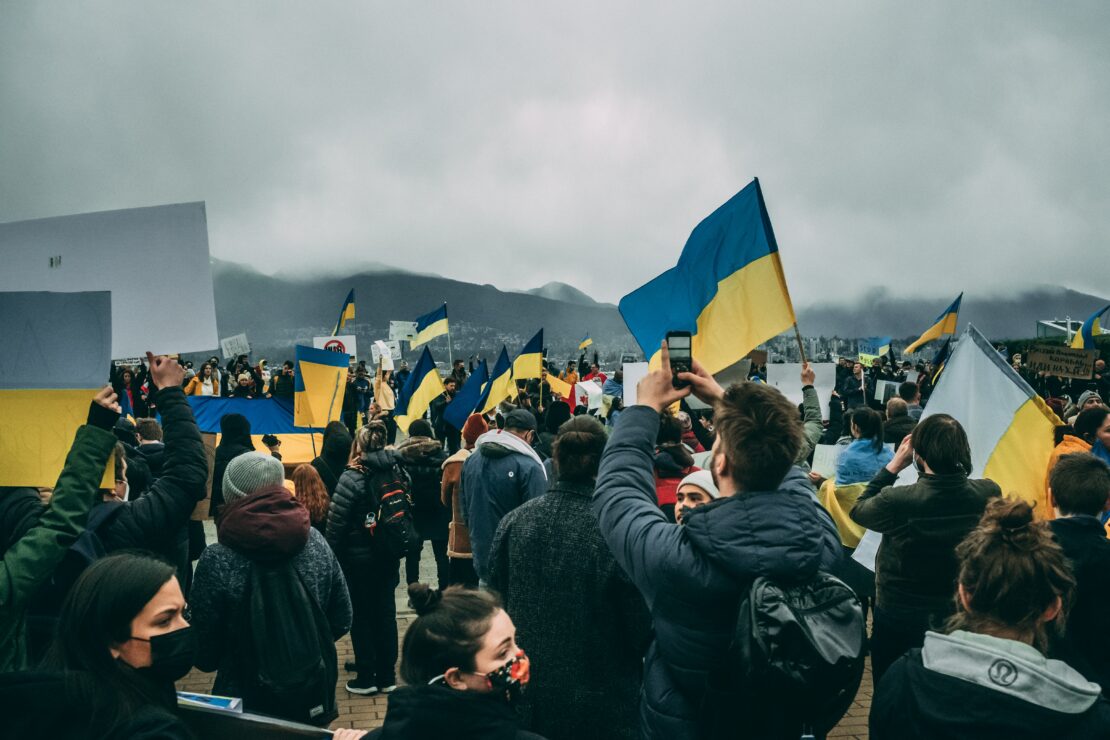Local organizations step in and help settle over 260 refugees on the Island as Russian invasion further displaces Ukrainian citizens

Vancouver protest, photo by bcmplo via Unsplash.
In late February, news broke that Russia had invaded Ukraine. In Victoria and around the world, Ukrainians and allies took to social media to show their support and call on international governments to send aid and weapons to Ukraine.
As part of the #StandWithUkraine movement, rallies were held all over the world. The lawn of the legislature in Victoria was flooded with blue and yellow, letters were mailed to MPs, and money was raised for Ukrainians on the ground. At the centre of it all was President of the Ukrainian Canadian Congress (UCC) Victoria Branch and UVic grad student Devon Sereda Goldie.
“When I took on this role, I definitely didn’t think that anything like this would ever happen,” said Sereda Goldie.
“It’s … very gratifying to know that my voice and our community’s voices are being heard and being sought out.”
Since February, Russia has taken control of parts of Ukraine, including Mariupol. While Ukraine is pushing back in some areas, according to Alisha Gajjar-Fleming — a UVic graduate student studying the conflict — “one of the upcoming deciding factors about the next stage in the war is about how well each side is going to be able to resupply their front lines.”
Over the past four months, one third of Ukrainians have been forced to leave their homes due to the conflict, with an estimated 20 million people displaced within Ukraine, many of whom are unable to leave the area they are in.
“Very quickly, we realized the need to shift our focus to supporting the Ukrainians who were going to be arriving in Victoria,” said Sereda Goldie.
As a result, the UCC Victoria Branch, in collaboration with other groups on the Island, including the Ukrainian Cultural Centre, launched Help Ukraine Vancouver Island. The project supports Ukrainians who are settling on Vancouver Island by providing assistance with everything from getting a visa and social insurance number to finding a host family.
“Our goal has become to help people arrive and become independent and not need our support anymore,” said Sereda Goldie.
The project, run by more than 350 volunteers, has helped over 260 individuals from Ukraine get settled on Vancouver Island.
The Kiwanis Village Society recently provided a building with 15 units to assist Help Ukraine Vancouver Island in their mission. According to Sereda Goldie, the building will be used to house Ukrainians who require accessible housing, starting in July. Rooms will also be set aside for those required to quarantine.
Part of Sereda Goldie’s role is to meet with government officials to bring problems to their attention, such as issues with online visa applications and other government programs, and to advocate for Ukrianians who are coming to B.C.
“My weekly phone call with some of the staff members from the Premier’s office is literally me saying, ‘here [are] the things that aren’t working this week. Please fix them,’” said Sereda Goldie.
While the provincial government has been responsive to her feedback, Sereda Goldie could not say the same about the federal government.
“It’s been really hard to communicate with the federal government, and their support has really been lacking in a lot of ways. They have been announcing a lot of programs to support both Ukraine and Ukrainians arriving here, but when they announce them, they haven’t thought through how they’re going to work.”
As a result, much of the work to help refugees navigate assistance programs and applications has fallen to local volunteers like those working for Help Ukraine Vancouver Island.
According to both Sereda Goldie and Gajjar-Fleming, the UVic community is also working to support Ukrainian refugees who are coming to the Island.
The Faculty of Humanities recently announced the Ukraine Emergency Doctoral Student Fellowship in the Humanities. The fellowship will provide funding and support for a PhD student enrolled in an Ukrainian university to spend one year studying Ukrainian history, language, or culture, among other options, at UVic.
Gajjar-Fleming says that even though the Department of Germanic and Slavic studies has been quiet over the summer, everyone is “doing what they can to support Ukraine.” For Gajjar-Fleming, part of this means working on her thesis to make sure her work is responsive to current events.
“It’s been really great to see the department that before the war had a stronger focus on Russian culture, really shifting to put this particular war and Ukrainian culture more in the spotlight,” echoed Sereda Goldie. “Especially at a time where not only Ukrainian nationhood is being threatened, but also Ukrainian culture and identity.”







